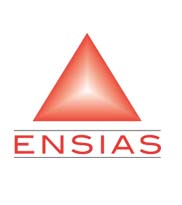- Accueil
-
L'Ecole
-
FORMATIONS
-
FORMATION INGENIEUR
-
Nouvelles filières offertes
- Ingénierie Intelligence Artificielle (2IA)
- Smart Supply Chain & Logistics (2SCL)
- Business Intelligence & Analytics (BI&A)
- Cybersécurité, Cloud et Informatique Mobile (CSCC)
- Data and Software Sciences (D2S)
- Génie de la Data (GD)
- Génie Logiciel (GL)
- Ingénierie Digitale pour la Finance (IDF)
- Smart System Engineering (SSE)
- REGLEMENT DES ETUDES DE L’ENSIAS CYCLE INGENIEUR
-
Nouvelles filières offertes
-
FORMATION INGENIEUR
- FORMATION CONTINUE
-
Recherche
- INTERNATIONAL
- ENTREPRISES
- VIE ESTUDIANTINE
- BIBLIOTHEQUE
LES DERNIÈRES INFORMATIONS
Are the expected benefits of requirements reuse hampered by distance? An experiment
| Titre | Are the expected benefits of requirements reuse hampered by distance? An experiment |
| Publication Type | Journal Article |
| Year of Publication | 2016 |
| Authors | de Gea, JMCarrill, Nicolas, J, Fernandez-Aleman, JL, Toval, A, Idri, A |
| Journal | SPRINGERPLUS |
| Volume | 5 |
| Date Published | DEC 20 |
| ISSN | 2193-1801 |
| Abstract | Background: Software development processes are often performed by distributed teams which may be separated by great distances. Global software development (GSD) has undergone a significant growth in recent years. The challenges concerning GSD are especially relevant to requirements engineering (RE). Stakeholders need to share a common ground, but there are many difficulties as regards the potentially variable interpretation of the requirements in different contexts. We posit that the application of requirements reuse techniques could alleviate this problem through the diminution of the number of requirements open to misinterpretation. Results: This paper presents a reuse-based approach with which to address RE in GSD, with special emphasis on specification techniques, namely parameterised requirements and traceability relationships. An experiment was carried out with the participation of 29 university students enrolled on a Computer Science and Engineering course. Two main scenarios that represented co-localisation and distribution in software development were portrayed by participants from Spain and Morocco. The global teams achieved a slightly better performance than the co-located teams as regards effectiveness, which could be a result of the worse productivity of the global teams in comparison to the co-located teams. Subjective perceptions were generally more positive in the case of the distributed teams (difficulty, speed and understanding), with the exception of quality. Conclusions: A theoretical model has been proposed as an evaluation framework with which to analyse, from the point of view of the factor of distance, the effect of requirements specification techniques on a set of performance and perception-based variables. The experiment utilised a new internationalisation requirements catalogue. None of the differences found between co-located and distributed teams were significant according to the outcome of our statistical tests. The well-known benefits of requirements reuse in traditional co-located projects could, therefore, also be expected in GSD projects. |
| DOI | 10.1186/s40064-016-3782-0 |
Revues:
LIENS UTILES
Localisation
Contactez-nous
ENSIAS
 Avenue Mohammed Ben Abdallah Regragui, Madinat Al Irfane, BP 713, Agdal Rabat, Maroc
Avenue Mohammed Ben Abdallah Regragui, Madinat Al Irfane, BP 713, Agdal Rabat, Maroc
![]() Télécopie : (+212) 5 37 68 60 78
Télécopie : (+212) 5 37 68 60 78
![]() Secrétariat de direction : 06 61 48 10 97
Secrétariat de direction : 06 61 48 10 97
Secrétariat général : 06 61 34 09 27
Service des affaires financières : 06 61 44 76 79
Service des affaires estudiantines : 06 62 77 10 17 / n.mhirich@um5s.net.ma
CEDOC ST2I : 06 66 39 75 16
Résidences : 06 61 82 89 77
- Compteur de visiteurs:641,451
Education - This is a contributing Drupal Theme
Design by WeebPal.
Design by WeebPal.



































